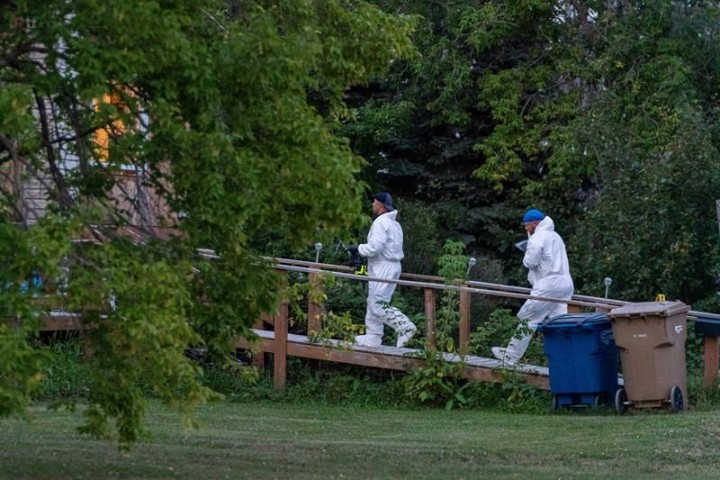News
Manhunt continues for suspects in Saskatchewan stabbings, police remain tight-lipped


|
|
Investigators continued their “relentless” manhunt Monday for two suspects accused in a series of stabbings that left 10 people dead and at least 15 others injured in rural Saskatchewan a day earlier.
The men were still on the lam 24 hours after officials first issued an emergency alert warning residents of the rampage on the James Smith Cree Nation and the nearby village of Weldon, Regina Police Chief Evan Bray said in a video posted to Twitter early Monday.
“This despite ongoing, relentless efforts through the night by both the RCMP and the Regina Police Service to locate these two individuals,” he said.
“We’ve got a fresh set of investigators and shifts coming in today that will take over this investigation. And we will not stop this investigation until we have those two safely in custody.”
RCMP said they planned to provide another update later Monday morning.
A dangerous persons alert remained in effect from Alberta to Manitoba for Damien Sanderson, 31, and Myles Sanderson, 30.
Damien Sanderson is described as five feet, seven inches tall and 155 pounds, and Myles Sanderson as six-foot-one and 200 pounds.
Both have black hair and brown eyes and may be driving a black Nissan Rogue with licence plate 119 MPI, although police have said it is possible they have switched vehicles.
Investigators have said the attacks took place at 13 different locations on the James Smith Cree Nation and in nearby Weldon, northeast of Saskatoon, with police getting the first reports on the First Nation before 6 a.m. Sunday.
Emergency responders took 15 survivors to hospital, but said it’s possible more people were injured and sought treatment on their own.
Investigators have said some of the victims were targeted while others were chosen at random, though they did not say how they know.
Doreen Lees, an 89-year-old resident from Weldon, said she and her daughter thought they saw one of the suspects when a car came barrelling down her street early Sunday.
Lees said a man approached them and said he was hurt and needed help, but said he took off when her daughter said she would call for help.
“He wouldn’t show his face. He had a big jacket over his face. We asked his name and he kind of mumbled his name twice and we still couldn’t get it,” she said. “He said his face was injured so bad he couldn’t show it.”
Lees said she was concerned and started to follow him, but her daughter told her to come back to the house.
There’s been no official word on the identities of the victims, but Weldon residents have identified one of the deceased as 77-year-old Wes Petterson.
Saskatchewan Premier Scott Moe tweeted his condolences Sunday to the family and friends of the victims, with his office later saying flags at provincial government buildings will be lowered to half-mast one day for each person killed.
In a statement, Prime Minister Justin Trudeau said he was “shocked and devastated by the horrific attacks,” adding all Canadians offer their support as they mourn with the people of Saskatchewan and “everyone affected by this tragic violence.”
Bray, of the Regina Police Service, agreed the violence was affecting the province.
“There’s a lot of grief. There’s a lot of anxiety in our province and in our communities this morning and all day yesterday,” Bray said. “And really I think an important step for families and communities working through this will be to bring these two safely into custody.”
Rev. Wilfred Sanderson, who livestreamed a prayer service on Facebook on Sunday night, said members of the community had hoped to pray together in person.
“We were supposed to gather this evening at the gym, but we’re on lockdown for the safety of everybody, so we couldn’t gather. This is the safest way that we could reach you people,” he said during the livestream, which was shot in a kitchen.
“Lord, grant us strength to forgive,” Wilfred Sanderson said. “Grant us strength to get through this together.”
This report by The Canadian Press was first published Sept. 5, 2022.
— With files from The Associated Press
The Canadian Press
News
Canada carbon tax rebate: 2024 deposits start for some – CTV News


OTTAWA –
The first instalment of the 2024 Canada carbon rebate will be delivered to some Canadians Monday as long as they filed their taxes by the middle of March.
Canadians living in Alberta, Saskatchewan, Manitoba, Ontario, and all four Atlantic provinces will receive the first of four instalments Monday if they filed their 2023 taxes by March 15.
Those who filed their taxes since March 15 will see their first instalment on May 15, while those who file after Monday will wait until June or July.
The payments are based on household size and for a family of four range from $190 in New Brunswick to $450 in Alberta.
Ottawa also has just launched a new online estimator that shows how much you should get from the rebates.
In a bid to make the rebates more understandable Ottawa renamed them the “Canada Carbon Rebate” this year but is still negotiating with the big banks about changing how the deposits are labelled when they show up in your account.
Ottawa has been battling with banks about how the deposits are labelled since they moved to quarterly payments for the rebates in 2022.
Many Canadians were confused, or didn’t realize they even got the rebate, when payments showed up with vague labels including “EFT deposit from Canada”, “EFT Credit Canada.” or sometimes just “federal payment.”
The federal government asked the banks to help label them with the old moniker — the climate action incentive payment — but some didn’t arguing they had a 15 character limit for deposit description.
The deposits will be labelled different depending on where you bank, with some going with the full Canada Carbon Rebate name, others shortening it “CDACarbonRebate” or “Canada CCR/RCC.”
In French, the labels could be “Carbone RemiseCA” or “Dépôt direct/Remise canadienne sur carbone.”
The rebates are sent to offset what people pay in carbon pricing when they buy fuel so they’re not left worse off as a result.
People who do things to lower their fuel use are even better off because they still get the same rebate but pay less in carbon pricing.
The rebate amounts are set annually based on how much carbon price Ottawa expects to collect in each province.
British Columbia, Quebec and Northwest Territories have their own carbon pricing system for consumers so residents there don’t receive the federal payment. Yukon and Nunavut use the federal system but have an agreement to distribute the proceeds themselves.
The parliamentary budget officer says about 80 per cent of Canadians get back more from the rebates than they pay.
He also says though that the economic impact of carbon pricing could lower wages over time, erasing that benefit for some Canadians. The government however argues that climate change itself can cause economic harm if it is left unchecked.
This report by The Canadian Press was first published April 15, 2024.
News
Meta's news ban changed how people share political info — for the worse, studies show – CBC.ca
Since Meta blocked links to news in Canada last August to avoid paying fees to media companies, right-wing meme producer Jeff Ballingall says he has seen a surge in clicks for his Canada Proud Facebook page.
“Our numbers are growing and we’re reaching more and more people every day,” said Ballingall, who publishes up to 10 posts a day and has some 540,000 followers.
“Media is just going to get more tribal and more niche,” he added. “This is just igniting it further.”
Canada has become ground zero for Facebook’s battle with governments that have enacted or are considering laws that force internet giants — primarily the social media platform’s owner Meta and Alphabet’s Google — to pay media companies for links to news published on their platforms.
Facebook has blocked news sharing in Canada rather than pay, saying news holds no economic value to its business.
It is seen as likely to take a similar step in Australia should Canberra try to enforce its 2021 content licensing law after Facebook said it would not extend the deals it has with news publishers there. Facebook briefly blocked news in Australia ahead of the law.
The blocking of news links has led to profound and disturbing changes in the way Canadian Facebook users engage with information about politics, two unpublished studies shared with Reuters found.
“The news being talked about in political groups is being replaced by memes,” said Taylor Owen, founding director of McGill University’s Centre for Media, Technology and Democracy, who worked on one of the studies.
“The ambient presence of journalism and true information in our feeds, the signals of reliability that were there, that’s gone.”
Young people on Instagram will face new barriers if they send or receive nude photos. The move is intended to protect kids against abuse and blackmail, but child advocates say parent company Meta isn’t doing enough.
The lack of news on the platform and increased user engagement with opinion and non-verified content has the potential to undermine political discourse, particularly in election years, the studies’ researchers say. Both Canada and Australia go to the polls in 2025.
Other jurisdictions, including California and Britain, are also considering legislation to force internet giants to pay for news content. Indonesia introduced a similar law this year.
Blocked
In practice, Meta’s decision means that when someone makes a post with a link to a news article, Canadians will see a box with the message: “In response to Canadian government legislation, news content can’t be shared.”
Where once news posts on Facebook garnered between five million and eight million views from Canadians per day, that has disappeared, according to the Media Ecosystem Observatory, a McGill University and University of Toronto project.
Although engagement with political influencer accounts such as partisan commentators, academics and media professionals was unchanged, reactions to image-based posts in Canadian political Facebook groups tripled to match the previous engagement with news posts, the study also found.
The research analyzed some 40,000 posts and compared user activity before and after the blocking of news links on the pages of some 1,000 news publishers, 185 political influencers and 600 political groups.
A Meta spokesperson said the research confirmed the company’s view that people still come “to Facebook and Instagram even without news on the platform.”
Canadians can still access “authoritative information from a range of sources” on Facebook, and the company’s fact-checking process was “committed to stopping the spread of misinformation on our services,” the spokesperson said.
‘Unreliable’ sources
A separate NewsGuard study conducted for Reuters found that likes, comments and shares of what it categorized as “unreliable” sources climbed to 6.9 per cent in Canada in the 90 days after the ban, compared to 2.2 per cent in the 90 days before.
“This is especially troubling,” said Gordon Crovitz, co-chief executive of New York-based NewsGuard, a fact-checking company which scores websites for accuracy.
Crovitz noted the change has come at a time when “we see a sharp uptick in the number of AI-generated news sites publishing false claims and growing numbers of faked audio, images and videos, including from hostile governments … intended to influence elections.”
School boards in the Greater Toronto Area and Ottawa are taking some of the largest social media companies to court over their products, alleging they are harming students and the broader education system. CBC’s Dale Manucdoc dives into what we know so far about the lawsuit.
Canadian Heritage Minister Pascale St-Onge in an emailed statement to Reuters called Meta’s blocking of news an “unfortunate and reckless choice” that had left “disinformation and misinformation to spread on their platform … during need-to-know situations like wildfires, emergencies, local elections and other critical times.”
Asked about the studies, Australian Assistant Treasurer Stephen Jones said via email: “Access to trusted, quality content is important for Australians, and it is in Meta’s own interest to support this content on its platforms.”
Jones, who will decide whether to hire an arbitrator to set Facebook’s media licensing arrangements, said the government had made clear its position to Meta that Australian news media businesses should be “fairly remunerated for news content used on digital platforms.”
Meta declined to comment on future business decisions in Australia but said it would continue engaging with the government.
Facebook remains the most popular social media platform for current affairs content, studies show, even though it has been declining as a news source for years amid an exodus of younger users to rivals and Meta’s strategy of de-prioritizing politics in user feeds.
In Canada, where four-fifths of the population is on Facebook, 51 per cent obtained news on the platform in 2023, the Media Ecosystem Observatory said.
Two-thirds of Australians are on Facebook and 32 per cent used the platform for news last year, the University of Canberra said.
Unlike Facebook, Google has not indicated any changes to its deals with news publishers in Australia and reached a deal with the Canadian government to make payments to a fund that will support media outlets.
News
Food service strike: Air Canada, WestJet refine options at Toronto Pearson – Global News
More than 800 workers responsible for providing food and beverages on flights leaving Toronto Pearson International Airport are on strike.
The Gate Gourmet workers, an airline catering and logistics company, went on strike Tuesday after voting 96 per cent to reject a final offer from the company, Teamsters Local Union 647 said in a statement.
“Our members accepted a wage freeze during the pandemic to help this company survive,” said Martin Cerqua, lead union negotiator and president of Local Union 647.
“Now their managers brag about how profitable their operations have become at Pearson, while proposing wage increases as low as 89 cents an hour.”

The union expects many flights leaving Toronto will have little to no food on board; impacted airlines include WestJet, United Airlines, Delta Airlines, TAP Air Portugal, Air India, Aero Mexico, SAS Scandinavian Airlines, Jetlines, as well as Air Canada, which the union said will be most affected by the strike.
The union added Gate Gourmet workers are paid on average between $17.69 and $20 per hour, below other airline catering companies in Toronto and Gate Gourmet workers in Vancouver. The union also claims slashed staffing levels have put workers at risk.
In a statement, Gate Gourmet Canada said it’s “disappointed” that a strike is underway.

“On Friday, the union informed us that they would cease negotiations and demanded a final offer, which Gate Gourmet Canada presented. The union walked away from the negotiating table, despite our belief that Gate Gourmet’s offer is fair and market competitive,” it said, adding the company was offering a 12 per cent pay raise over three years.
“At our operation in Toronto, we have established contingency plans with our airline customers to minimize any impact on them and their passengers. We remain committed to doing right by our employees and ending the strike so that we can continue to partner with our airlines customers and serve the travelling public.”
Air Canada, WestJet respond to strike
Air Canada and WestJet, Canada’s largest airlines, said in separate statements they’ve prepared for the work stoppage.
“We anticipate there will be no impact on our international flights, but we plan to make some adjustments to food and beverage service on certain North American flights departing from and, in some cases on shorter routes, returning to Toronto,” an Air Canada spokesperson told Global News Toronto in a statement Tuesday.
“Short-haul flights of less than two hours duration being most impacted.”

The airline added that flights over two hours within North America will have fewer menu options, while flights under two hours will not have hot meals available; snacks and water service will remain.
Meanwhile, WestJet said its Boeing 737 flights leaving Pearson will be impacted.
“Guests who are eligible to receive an inflight meal including those in the Premium cabin or extended comfort seating, and all guests travelling on transatlantic flights will receive either an alternative option or a food and beverage voucher for use in the terminal, pre-departure,” the company said in a statement on its website.
“In addition, WestJet is advising guests travelling to or from Toronto to plan ahead and bring an extra snack and/or beverage for their journey.”
More on Toronto
© 2024 Global News, a division of Corus Entertainment Inc.
-
Media17 hours ago
Trump Media plunges amid plan to issue more shares. It's lost $7 billion in value since its peak. – CBS News
-



 Tech21 hours ago
Tech21 hours agoJava News Roundup: JobRunr 7.0, Introducing the Commonhaus Foundation, Payara Platform, Devnexus – InfoQ.com
-
Real eState21 hours ago
Real estate mogul concerned how Americans will deal with squatters: ‘Something really bad is going to happen’ – Fox Business
-



 Sports20 hours ago
Sports20 hours agoRafael Nadal confirms he’s ready for Barcelona: ‘I’m going to give my all’ – ATP Tour
-
Science21 hours ago
Total solar eclipse: Continent watches in wonder – Yahoo News Canada
-
Art23 hours ago
Art Bites: The Movement to Remove Renoir From Museums
-



 Investment18 hours ago
Investment18 hours agoLatest investment in private health care in P.E.I. raising concerns – CBC.ca
-



 Health23 hours ago
Health23 hours agoOpioid-related deaths between 2019 and 2021 across 9 Canadian provinces and territories















